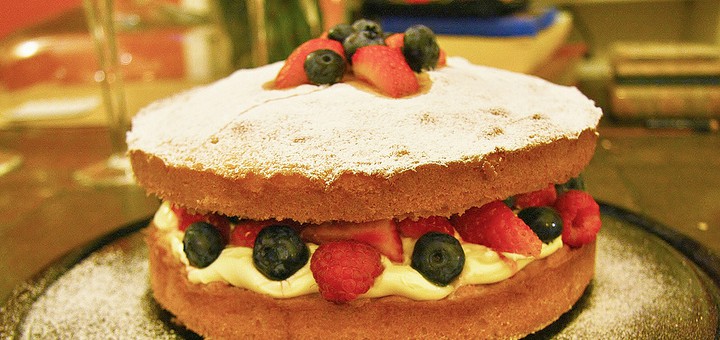
 By ChodHound via Flickr, CC BY-SA 2.0[/caption]
Back in 2016 some friends of ours gave my husband and I a book called Happy Are You Poor. Saying that this book changed our lives is an understatement. In this book, Father Thomas Dubay challenges the reader to look beyond superfluities and dig deep into the idea of a sparing-sharing way of life. He makes you question what you are wearing, what you are eating, what you are drinking, and what you are thinking. It had such a profound impact on me and my family that we decided to take a few baby steps into the realms of gospel poverty.
To start, our family took a good look at our food intake -- with a heavy emphasis on the desserts and candy. It was normal for us to have cookies or sweets every night after dinner and sometimes even after lunch! But after reading the book we concluded that we needed to cut back. But how? After some praying and thinking, we had a divine revelation.
Feast Days!
If you look at a Catholic calendar, you will find each day has a saint or a special religious event. If you look closely you will see that some of the saints and events are in a normal font. We chose to celebrate the feast days on Sundays and the days that were highlighted in bold.
By ChodHound via Flickr, CC BY-SA 2.0[/caption]
Back in 2016 some friends of ours gave my husband and I a book called Happy Are You Poor. Saying that this book changed our lives is an understatement. In this book, Father Thomas Dubay challenges the reader to look beyond superfluities and dig deep into the idea of a sparing-sharing way of life. He makes you question what you are wearing, what you are eating, what you are drinking, and what you are thinking. It had such a profound impact on me and my family that we decided to take a few baby steps into the realms of gospel poverty.
To start, our family took a good look at our food intake -- with a heavy emphasis on the desserts and candy. It was normal for us to have cookies or sweets every night after dinner and sometimes even after lunch! But after reading the book we concluded that we needed to cut back. But how? After some praying and thinking, we had a divine revelation.
Feast Days!
If you look at a Catholic calendar, you will find each day has a saint or a special religious event. If you look closely you will see that some of the saints and events are in a normal font. We chose to celebrate the feast days on Sundays and the days that were highlighted in bold.
 Copyright 2018 Kelly Tallent. All rights reserved.[/caption]
So what goes into this Feast Day celebration, one might ask? Well, a few things, actually. We all sat down and discussed what we considered to be the superfluities in our lives – besides the sweets. For the adults, that ended up being alcohol. For the kids, that ended up being video games. Once we did our honest appraisal, we agreed to give up those things during the week and to only have them on our Feast Day celebrations. When our Feast Days rolled around we allowed ourselves to have desserts after lunch and dinner; the kids could have one hour of video games (more if they were super helpful, kind, or obedient); and the parents could partake in the indulgence of the grapes and grains.
Now, I can imagine that there are some questions that need to be answered so I will address them as well as I can:
Copyright 2018 Kelly Tallent. All rights reserved.[/caption]
So what goes into this Feast Day celebration, one might ask? Well, a few things, actually. We all sat down and discussed what we considered to be the superfluities in our lives – besides the sweets. For the adults, that ended up being alcohol. For the kids, that ended up being video games. Once we did our honest appraisal, we agreed to give up those things during the week and to only have them on our Feast Day celebrations. When our Feast Days rolled around we allowed ourselves to have desserts after lunch and dinner; the kids could have one hour of video games (more if they were super helpful, kind, or obedient); and the parents could partake in the indulgence of the grapes and grains.
Now, I can imagine that there are some questions that need to be answered so I will address them as well as I can:
- Did you stick with it?
- What were the benefits?
- Why should I do something like this?
Do you have some great family faith-walk ideas that you would like to share? Comment below!
Copyright 2018 Kelly Tallent
About the Author

Kelly Tallent
Kelly Tallent is mother to six children and wife to a living saint. She is a Theology/English student at Holy Apostles College and Seminary as well as a Pre-School 3 aide at a Catholic school. She is also the author of The Joyful Pessimist, a self-published journal that delves deeply into the intricacies of living the life of a Catholic Christian woman. You can find her book, podcast, and blog at The Joyful Pessimist.


.png?width=1806&height=731&name=CatholicMom_hcfm_logo1_pos_871c_2728c%20(002).png)
Comments